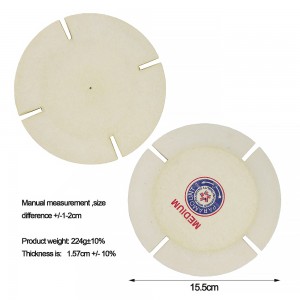The global market for wool felt wheels is experiencing a significant shift as emerging economies present new and lucrative opportunities for manufacturers and suppliers. As industries in regions such as Southeast Asia, South America, and Africa rapidly develop, the demand for high – quality polishing and finishing tools like wool felt wheels is on the rise, opening up untapped markets for this versatile product.
In Southeast Asia, countries like Vietnam, Indonesia, and Thailand are witnessing a boom in their manufacturing sectors. The growth of industries such as automotive assembly, furniture production, and electronics manufacturing has led to an increased need for reliable finishing solutions. Wool felt wheels, with their ability to deliver a superior polish on a variety of materials, are becoming essential tools in these industries. For example, in the Vietnamese automotive industry, which has seen a surge in domestic production and export of vehicles, wool felt wheels are being used for paint correction and surface finishing to meet international quality standards.
South America also offers vast potential for the wool felt wheel market. Brazil, the largest economy in the region, is experiencing growth in sectors such as aerospace, construction, and metalworking. As Brazilian companies strive to enhance the quality of their products to compete globally, the demand for advanced polishing tools like wool felt wheels is escalating. In the aerospace industry, where precision and quality are non – negotiable, wool felt wheels are being employed to finish aircraft components, ensuring both functionality and aesthetic appeal.
In Africa, the development of infrastructure and the growth of manufacturing hubs in countries like South Africa, Egypt, and Nigeria are driving the adoption of wool felt wheels. The construction industry, in particular, is booming across the continent, with large – scale building projects underway. Wool felt wheels are being used for polishing stone, metal, and other building materials, contributing to the creation of high – quality structures. Additionally, the growing jewelry and handicraft industries in Africa are also turning to wool felt wheels to achieve professional – grade finishes on their products.
However, entering these emerging markets is not without its challenges. Cultural and regulatory differences can pose significant barriers for international manufacturers. Understanding local consumer preferences, market regulations, and distribution channels is crucial for success. For instance, in some countries, there may be specific import regulations or quality standards that wool felt wheel products need to meet. Moreover, competition from local manufacturers, who may have a better understanding of the local market and cost – advantage, also requires international players to develop unique value propositions.
To overcome these challenges, companies are partnering with local distributors and suppliers to gain a better foothold in the market. They are also customizing their products to meet the specific needs of local industries. For example, in regions where there is a high demand for wool felt wheels in the agricultural machinery sector, manufacturers are developing wheels with specific abrasion properties suitable for polishing metal parts of tractors and other farm equipment.
As emerging markets continue to grow and develop, the potential for the wool felt wheel industry is immense. With the right strategies and a focus on innovation and customization, manufacturers and suppliers can capitalize on these new opportunities and drive the further expansion of the global wool felt wheel market.

Post time: Jun-11-2025
